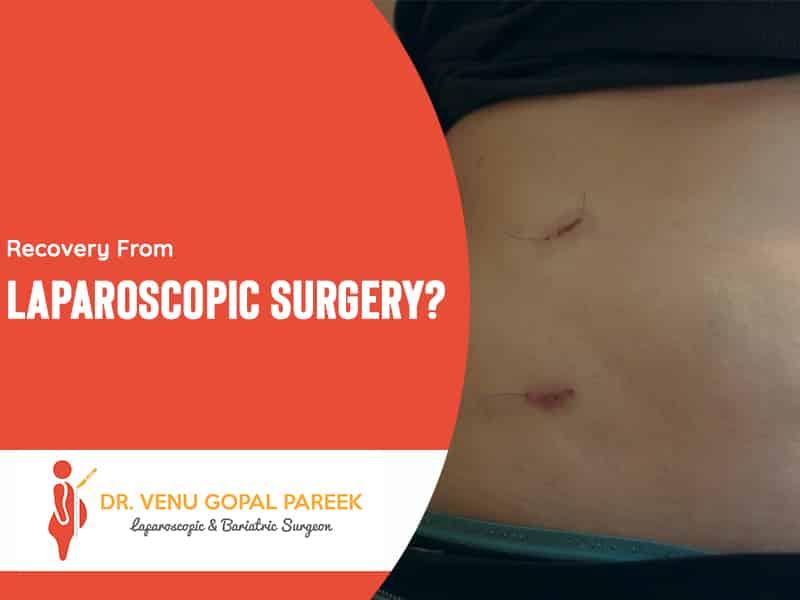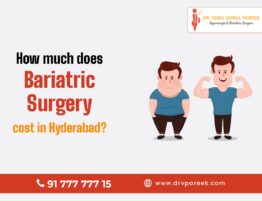
Recovery From Laparoscopic Surgery?
Laparoscopic surgery is synonymous with minimally invasive surgery and is one of the most popular mode of Surgery. It is a surgical and diagnostic procedure used for examining organs. It also aids in performing surgeries of abdominal organs such as the liver kidney, gall bladder, intestine etc. It is a low risk, minimally invasive procedure that requires minor incisions.
Laparoscopic surgery is used widely by doctors/surgeons in Hyderabad to treat diseases. Laparoscopy allows a doctor to see your body in real-time without performing open surgery. This procedure also allows a doctor to obtain biopsy samples.
We shall discuss in detail, through this blog from Dr. Venu Gopal Pareek, as to how Laparoscopy is used to examine and treat abdominal organs and also the recovery time.
What is Laparoscopic Surgery?

Laparoscopy is usually done under general anesthesia. It requires a small incision on the abdomen, and the abdomen is filled with CO2 gas for inflation. The sabdomen gets distended giving the doctor a better view of the internal organs.
A Laparoscope is a long and thin tube with a high-intensity light and high-resolution cameras at the front. The device is inserted through a small incision made on the skin surface. The high-resolution camera fitted to the scope displays images on the video monitor.
Recovery from Laparoscopic Surgery

Recovery from laparoscopic surgery varies from individual to individual. Each of us heal differently. Patient’s expectations, the length of the operation, the surgeon, and the facility where the surgery is performed play key roles in the recovery. The following information shall help you to understand the various factors which affect the recovery time, post-operative experiences and steps for quick recovery.
Length of stay:
Laparoscopy is usually done in an hospital setting. However, an overnight stay may be required after complicated or lengthy operations. For example, in cases of partial or complete intestinal resection, a hospital stay may extend to several days or several weeks even.
Postoperative activities:
There are no standard rules as to when you can return to daily activities after a Laparoscopic surgery. In some cases, your doctor may ask you to avoid driving vehicles for two weeks after surgery. Driving is advised only when you feel strong enough to bring a car to a complete stop in an emergency, else employing a driver or taking the help of family or friends to drive the vehicle is recommended. Swimming and bathing are also restricted. The usage of stairs is also restricted. The treating surgeon will slowly allow you to tend to your daily activities based on your recovery.
Shower:
You can take a shower the day after surgery, but care should be exercised not to dampen the wound site. Your treating doctor will decide this.
Wound care:

Keep your wound dry and clean. No special cream or ointment is needed. Through soluble stitches, the wound is closed. Then it is covered with a bandage or surgical adhesive. The dressing protects the incision for two or more weeks. The adhesive can be removed with soap and water after that and gently cleaned. Minor bleeding at the incision site is common. Some patients experience bruising at the incision site, and it will gradually subside on its own. You may feel a tingling sensation at the incision site due to nerve injuries, and this will also heal gradually.
Sore throat:
Some patients experience sore throat due to the tube that is inserted during anesthesia. Intake of throat lozenges or warm tea gives relief from these symptoms. These symptoms will go away within a few days.
Pain after surgery:
You are taken to the recovery room post surgery. As the anesthesia wears off, you may feel pain. Pain medication is often suggested. Coughing can cause pain. It would be beneficial if you put a pillow over your stomach to support your stomach when you cough.
Medications:

Taking pain medications regularly at home for the first few days after surgery helps with reducing pain. Medication can lead to constipation. Narcotic analgesia can sometimes help you sleep at night.
Abdominal discomfort/ bloating:

Stomach discomfort is expected after surgery and resolves over time. Intestinal manipulation during laparoscopic surgery can stun the intestine. General anesthesia can slow the intestinal process and prevent gas and feces from coming out. Walking promotes peristaltic bowel movements, relieves gas, and constipation. If you are allowed to drink, hot mint tea is a great way to support gastrointestinal motility and also to reduce gas bloating.
Post-op blues:
You may experience periods of emotional ups and downs after surgery, such as crying easily, feeling anxious, excited, or suspicious. These can last for several weeks and are common. All of these will pass over time, and you will feel in control again.
Nausea:
Nausea after Laparoscopy is very common. Anesthesia is the predominant factor causing nausea immediately after surgery. After the first 24 hours, nausea can be treated with pain relief or antibiotic medications. Many medicines help to resolve nausea. Some can be taken before, during, or after surgery. Talk to your surgeon about ways to reduce nausea.
Loose clothes after surgery:

Wear comfortable clothes for the first few weeks after Laparoscopy, as the incision site will be sensitive and because of distended abdomen. Therefore, try not to aggravate the condition by wearing tight clothes.
Follow-up visit:
It is important to visit your treating doctor for a follow-up visit at about two weeks after Laparoscopy. It is during this visit, your doctor may suggest you when to resume your normal activities.
Things to watch out following surgery and call the doctor immediately:
- Fever higher than 38C degrees
- Shortness of breath
- Dizziness
- Heavy vaginal bleeding (in female)
- Severe pain not relieved with pain medication
- Persistent nausea or vomiting
- Increased pain, redness, or swelling at the incision
- Severe diarrhea, bloody diarrhea, and sometimes accompanied by fever or worsening pain
- Inability to pass urine
Conclusion:
The time needed to recover from Laparoscopy, as mentioned earlier, varies from individual to individual. Recovery time depends on factors such as the cause for the surgery, your overall health, and surgical complications.
Recovery time after Laparoscopy to treat an illness depends on the type of treatment. After such minor surgery, such as the appendix, you might be able to resume normal activities in 3 weeks. After a major surgery, such as bariatric surgery or cancer, recovery time can be 2 weeks. Your surgeon can provide you with more information about when you can resume normal activities. Always go to the nearest hospital if an emergency visit is needed after surgery.
If you need to know about laparoscopic surgery and its benefits, contact Dr. Venugopal Pareek at +91 91-777-77715 and book your appointment.







